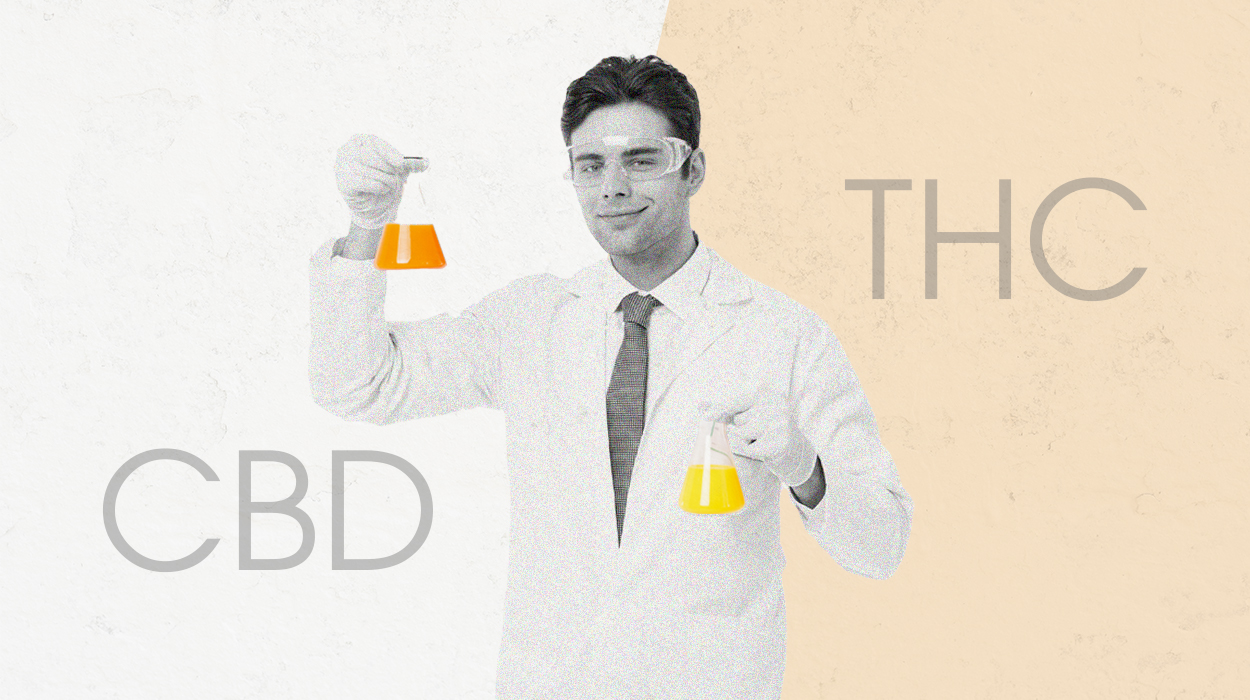 Expert's opinion
Expert's opinion
Expert's opinion
The article is a subjective view on this topic written by writers specializing in medical writing.
It may reflect on a personal journey surrounding struggles with an illness or medical condition, involve product comparisons, diet considerations, or other health-related opinions.
Although the view is entirely that of the writer, it is based on academic experiences and scientific research they have conducted; it is fact-checked by a team of degreed medical experts, and validated by sources attached to the article.
The numbers in parenthesis (1,2,3) will take you to clickable links to related scientific papers.
Difference Between CBD & THC 2024: Key Differences, Benefits & Side Effects

By now, CBD has become Wall Street’s next big thing due to CBD mania. The health benefits of CBD oil are promising. Many people have gotten their hands on CBD products, as it works very well against a lot of health issues. If you are new to the CBD trend, then you might want to know the differences between CBD and THC.
Firstly, to know what’s legal and what’s not. Secondly, to be aware of the benefits and side effects, and lastly, to know what you are paying for. Dive into this article to know the difference between CBD and THC.
How Does CBD Differ From THC?
Cannabis is made of nearly 120 compounds which are known as Cannabinoids. CBD and THC are the most common ones. Both marijuana and hemp contain THC and CBD. However, marijuana contains more THC and less CBD. On the other hand, hemp contains more CBD and less THC. Also, unlike THC, CBD doesn’t stimulate euphoric-like psychoactive sensations.
What’s The Difference Between CBD And THC?
Both CBD and THC come from the natural compounds of Cannabis Sativa plants. Both hemp and cannabis produce THC and CBD. Hemp is defined as a cannabis plant with less than 0.3% percent of THC. whereas, marijuana is a cannabis plant with more than 0.3% THC. CBD and THC are the most common cannabinoids that cause drug-like reactions in our bodies.
Cannabis has higher concentrations of THC. Whereas, hemp has a higher concentration of CBD. An average strain of cannabis today holds about 12% THC[1] compared to 4% in 1995.
CBD oil may have small amounts of THC in them, due to low levels of THC present in the hemp plant. Regular CBD oil should have 0.3 % or less to be legal at the federal level.
Hemp with 0.3% or less THC is considered legal according to the 2018 farm bill. THC is the crucial psychoactive compound in cannabis that gives sensations of high. Hence people associate it with the use of marijuana.
It is available in oils, edibles, or by smoking cannabis, capsules, tinctures, and many more forms. Whereas CBD won’t give you sensations of high. CBD is available in the form of gummies, gels, supplements, oils, and extracts.
Both CBD and THC interact with the body’s endocannabinoid system but have different effects. Although CBD and THC are both cannabinoids, they interact with different receptors in our brains.
The difference between CBD and THC lies in various factors like their psychoactive components, forms of availability, legality, medical benefits, drug tests, and side effects.
Differences In Psychoactive Components Of CBD Vs THC
Although the chemical structure is the same for both, their psychoactive effects differ. CBD also has psychoactive effects but is different from THC. CBD does not produce high sensations associated with THC.
THC binds to the cannabinoid (CB1) receptors in our brain and produces a sense of euphoria or high. Whereas, CBD has little binding effects, if at all, on CB1 receptors. It needs THC to bind to the CB1 receptors, which in turn helps reduce the unwanted psychoactive effects of THC, like sedation and euphoria.
THC, due to its high psychoactive response, is considered illegal in many US states. Whereas, CBD is considered a non-psychoactive compound, meaning that there’s an absence of euphoria that is associated with THC.
Although CBD may have trace amounts of THC of 0.3 % or less which is considered legal, it is not enough to produce the psychoactive response. CBD is popular for its health benefits and the absence of psychoactive side effects.
Medical Benefits Of CBD Vs THC
CBD and THC have similar health benefits. They both help in relieving similar health conditions. However, there is the absence of euphoric effects in CBD, but are present in THC. For the same reason, some people prefer CBD.
In June 2018, Food and drug administration (FDA) approved Epidiolex[2], the first medication that contains CBD, which can be prescribed to treat rare and difficult forms of epilepsy.
CBD can help with conditions such as seizures, pain, inflammation, inflammatory bowel disease, psychosis or mental disorders, nausea, anxiety, migraine, and depression. Epidiolex is approved for the conditions above.
THC helps with muscle spasticity, pain, glaucoma, to increase appetite, nausea, insomnia, and anxiety.
Side Effects Of CBD Vs THC
Even at large doses, CBD is well tolerated. However, the side effects that occur by using CBD are due to the drug-to-drug interaction among other medications and CBD according to research by WHO. Side effects of CBD are weight loss, dizziness, fatigue, appetite changes, diarrhea.
Coming to THC, the side effects are due to the psychoactive properties of the compound. However, neither of them is fatal. But, high levels of THC may be linked to long-term adverse psychiatric effects. This is especially marked in adolescents who take large amounts of THC.
Although there is no data to prove that using cannabis can cause psychiatric disorders like schizophrenia, THC causes temporary side effects such as dry mouth, coordination problems, increased heart rate, red eyes, memory loss, slower reaction times, anxiety, and memory loss.
The Legality Of CBD Vs THC
In the United States, laws on cannabis are changing from time and again. CBD is still categorized as a Schedule I drug under federal law. Hemp has been taken off from the Controlled Substance Act. However, the food and drug administration (FDA) and drug enforcement administrator (DEA) still classify CBD as a Schedule I drug.
Moreover, 33 states along with Washington D.C, have approved cannabis-related laws, which states that medical cannabis, even with high levels of THC, is legal. However, cannabis should be prescribed by a licensed physician. Furthermore, several states have made the use of THC and cannabis legal for recreational use. In states where cannabis is legal for medicinal or recreational use, you can buy CBD. However, before getting your hands on THC or CBD products, it’s important to know your state laws.
You could face legal penalties if you possess cannabis-related products in a state where it’s still illegal. Even medical marijuana, in the absence of medical advice in states where it’s illegal to use CBD products could get you in trouble.
Drug Testing Of CBD Vs THC
Cannabinoids like THC and CBD are stored in fat cells in our bodies. Your test can come positive on drug tests as it can show up for several days to weeks after consuming CBD products. However, not every test can detect CBD, but it is very much possible in CBD-sensitive tests. Most of the standard tests will look for the chemicals linked to THC, so usage of marijuana or THC might show up on screening.
Similarly, hemp can produce some amount of THC along with CBD, so the test might turn out positive for THC despite not consuming it. Remember, the products that claim to be free from THC may not be completely THC-free. So, for drug tests, you should not use any THC or CBD products.
What Is Medical Marijuana?
Medical marijuana is approved by food and drug administration for the treatment of epilepsy. However, the US Drug Enforcement Administration considers marijuana as a Schedule I drug, like heroin, ecstasy, and LSD, which are likely to be abused.
It is derived from marijuana plants and chemicals to treat health conditions. When the CBD-dominant version of medical marijuana is used, it is nothing but using CBD from hemp. The two cannabinoid medicines found and medically reviewed by FDA are Dronabinol and Nabilone to treat nausea and vomiting associated with chemotherapy.
The Cannabidiol drug named epidiolex was approved to treat two severe, rare forms of epilepsy named Lennox-gestalt syndrome and Dravet syndrome. It is illegal to use or prescribe marijuana under medical advice in states that do not allow it. There is no federal law that allows using it illegally.
Is CBD Legal?
Hemp-derived CBD products with less than 0.3% THC are legal at the federal level but are still illegal under a few state laws. In addition to this, cannabis-derived CBD products are illegal at the federal level but are legal under a few state laws. Check local legislation, especially while traveling. Bear in mind that the FDA has not approved CBD products without a prescription which are inaccurately labeled. It’s better to go with the ones that are approved by the FDA.
Final Words
Both CBD and THC pose health benefits and are considered safe under medical advice. But consider the drug interactions. Make sure to get your condition and the drugs you take medically reviewed before starting on CBD. Consult a qualified CBD Clinician and doctor before usage. Lastly, familiarize yourself with the state laws before using CBD or THC.
+ 2 sources
Health Canal avoids using tertiary references. We have strict sourcing guidelines and rely on peer-reviewed studies, academic researches from medical associations and institutions. To ensure the accuracy of articles in Health Canal, you can read more about the editorial process here
- ElSohly, M.A., Mehmedic, Z., Foster, S., Gon, C., Chandra, S. and Church, J.C. (2016). Changes in Cannabis Potency Over the Last 2 Decades (1995–2014): Analysis of Current Data in the United States. Biological Psychiatry, [online] 79(7), pp.613–619. Available at: https://www.ncbi.nlm.nih.gov/pmc/articles/PMC4987131/
- Office of the Commissioner (2020). FDA Approves First Drug Comprised of an Active Ingredient Derived from Marijuana to Treat Rare, Severe Forms of Epilepsy. [online] U.S. Food and Drug Administration. Available at: https://www.fda.gov/news-events/press-announcements/fda-approves-first-drug-comprised-active-ingredient-derived-marijuana-treat-rare-severe-forms



